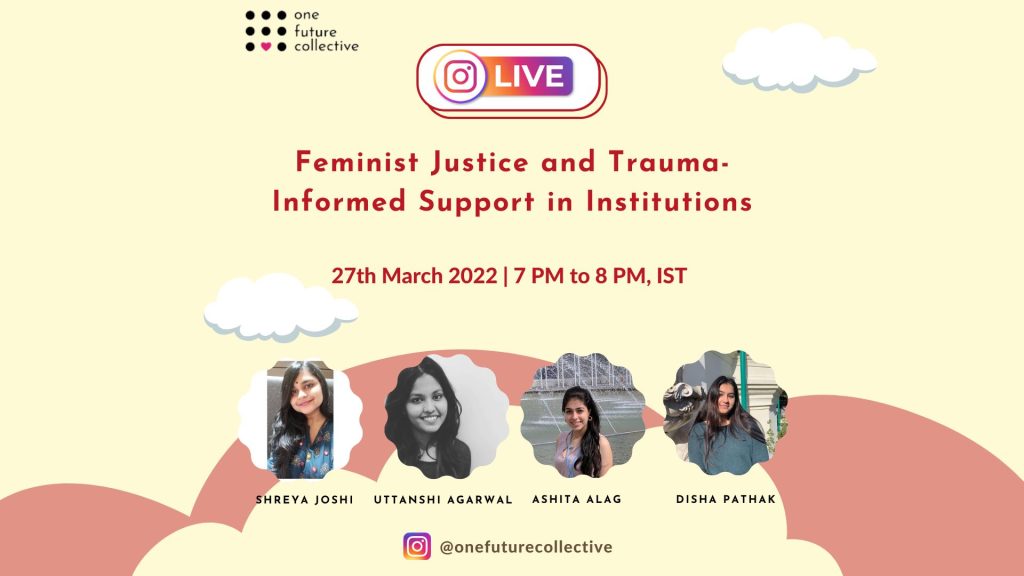On 27th March 2022, One Future Collective hosted an Instagram Live on ‘Feminist Justice and Trauma-Informed Support in Institutions’ hosted by Shreya, Senior Program Officer at One Future Collective. She was joined by Ashita, a lawyer pursuing her Master of Laws from Harvard Law School, and Disha, an activist and social researcher. The conversation revolved around the significance of trauma-informed support at individual and institutional levels and identifying how institutions can be systems of care and practice feminist justice.
The conversation started with the question of what feminist justice or trauma-informed care means and how they can be linked together. Ashita opened the discussion with her definition of feminist justice. She mentioned how the state and the justice system functions according to the male point of view in its structure and design. She emphasised how feminist justice would dismantle these structures and create new ones that lead to an equal, fair balance of power within society and institutions. Such an institution would not judge or put unfair blame, and the system would be aware that the actions of survivors are affected by their trauma and the psychosocial or physical effects of trauma. The justice delivery system also needed to teach a survivor-centric approach and give survivors power and agency to make their own decisions and put them at the center of our understanding. For instance, they should not be forced to face their perpetrator. Ashita also critiqued how the Indian justice system was only carceral, which survivors had to either opt in or opt-out of without any alternatives. Disha added that feminist justice would recognize how survivors needed a sensitive, trauma-informed, and positive approach. Disha looked at trauma-informed care from a service framework that would allow the survivor to heal in a sensitive cultural framework. It is also essential to develop a holistic understanding of what trauma means, including institutional discrimination and unfair hierarchy.
Since there has been a rise in a systematic approach to addressing trauma and vicarious trauma, Shreya asked if we see this change in India and how we can explore it further. Ashita mentioned how we had come a long way since trauma-informed conversations have started in various institutions and legal and medical professions. Different judgments have noted how the state and criminal justice system must create a guideline for interacting with survivors, providing mental health support and covering medical expenses. The MHRD has also released guidelines that explain how trauma can affect survivors and how survivors should not be asked about their previous sexual history. While these resources exist, their implementation differs from state to state; it depends on the training of the police and judicial officers, and there is no uniformity across the board. She mentioned how institutions also had to be trauma-informed to provide relief to survivors along with sensitive lawyers.
Shreya pointed out how the current system or the policies in institutions may end up in retraumatization of a person or a collective group as they reinforce unequal power dynamics or fail to ensure their safety and the kind of alternatives to rework the system. Disha spoke of how survivors have to narrate their trauma repeatedly in an environment that is not safe, sensitive, or supportive. There is also a tendency to focus on physical harm, while financial or emotional abuse are mostly neglected. The ‘innocent until proven guilty’ approach also hinders survivors from asking for positive assistance, and people don’t support them until a verdict is given. Disha mentioned how One Future Collective’s knowledge course for lawyers who work with survivors was also important.
Next, Shreya read out a small part from OFC’s resource on trauma-informed support and care. The paragraph was about the need for legal professionals or doctors to be trauma-informed to be inclusive, transparent, and sensitive to survivors. The paragraph also noted how the term ‘institutional trauma’ was used for structural oppression. However, such a term often made trauma an individual experience and neglected its sociopolitical contexts. Ashita questioned why we look at trauma from an individualist perspective in the first place. She mentioned how institutions could avoid responsibility for their discriminatory actions and structures by not confronting the trauma they have caused to marginalized communities. A sociopolitical understanding was essential to recognize and dismantle these structures and hold them accountable.
The conversation then turned to how policymakers play a part in ensuring trauma-informed institutions. Ashita mentioned how creating compassionate policies is vital for creating trauma-informed institutions, and the policymakers themselves need to understand the approach. Disha pointed out the need for cross-sector collaboration to facilitate sustainable change and provide funding. Ashita also mentioned that neutral policies were hardly ever survivor-sensitive and were designed to fail since they are applied to non-neutral societies. Thus, the institutions themselves must be cognizant of the institutional trauma and inculcate a sensitive and supportive design.
You can watch the full video here: https://www.instagram.com/tv/CbnCieZuDsF/
